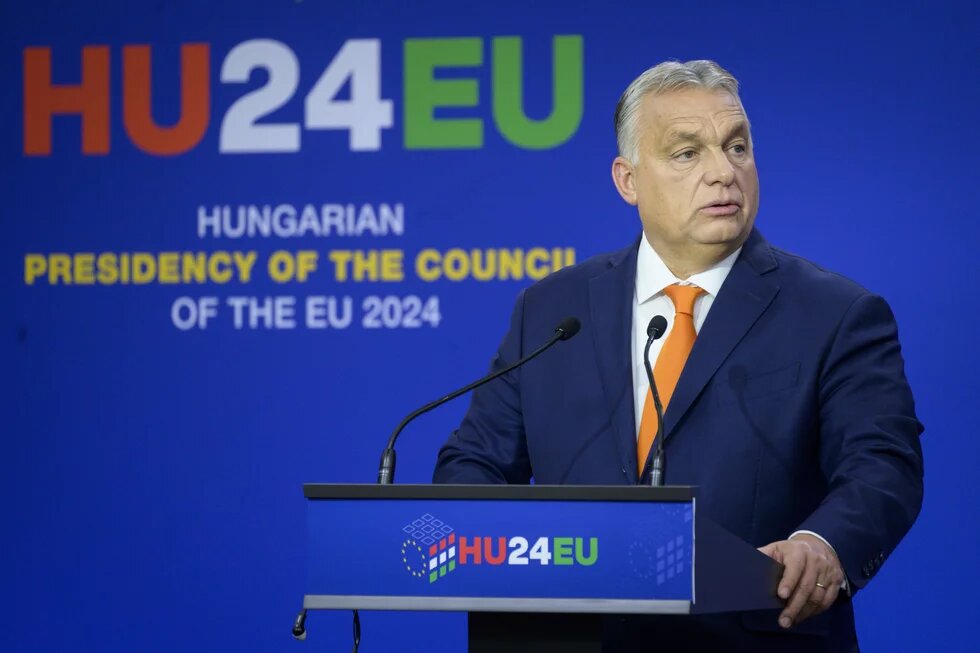From July 1 to December 31, 2024, Hungary held the presidency of the EU Council. The presidency underscored Prime Minister Viktor Orbán's foreign policy approach: a clear separation between communication and day-to-day operations. Despite growing tensions between Orbán and EU leaders, as well as unresolved disputes with key EU institutions, the Hungarian presidency has done its work accordingly in the second half of 2024.

The Hungarian government took over the leadership of the EU Council for six months with serious and unresolved disputes with all EU institutions. In September 2022, the European Parliament adopted a declaration that Hungary was no longer a democracy. At the beginning of summer 2023, just one year before the start of the Hungarian presidency, MEPs called on the Council to take the presidency away from the Hungarian government. In the new Parliament, elected in early June, the political groups that voted for this resolution gained the majority again. In December 2022, the European Council used the conditionality mechanism against the Hungarian government in an unprecedented move in the history of the EU, freezing more than €6 billion from the Cohesion Fund, as Member States saw their money as being at risk due to the weak rule of law. The European Commission has completely cut Hungary off from the Recovery and Resilience Facility (RRF) programme, as well as from billions of euros in further cohesion funds, also due to the weak rule of law. In 2024, the Court of Justice of the EU, at the Commission’s initiative, fined the Hungarian government €200 million, plus €1 million a day, for failing to implement an earlier ruling requiring changes to asylum law.
Orbán’s confrontational stance
Viktor Orbán, the Prime Minister of Hungary, said on 23 October 2024, the commemoration day of the 1956 freedom fight against the Soviets, “Independent Hungarian policy is unacceptable to Brussels. Let us face up to this fact! This is why Brussels has announced that it will get rid of Hungary’s national government. They have also announced that they want to impose a Brussels puppet government on the country. Here again is the old question: do we bow to the will of a foreign power – this time, the will of Brussels – or do we resist it? This is the difficult decision that now awaits Hungary. I propose that our voice be as clear and unequivocal as it was in ‘56.” In other words, he equated the EU institutions with the Soviet Union of the 1950s, and his party’s position with the armed struggle of the Hungarian people.
Two weeks later, the leaders of the Member States held an informal summit in Budapest, organised by the Hungarian presidency. At an official press conference at the event, Viktor Orbán spoke of his government’s rebellion against the EU Court of Justice. “We decide things, governments implement them, and our joint decisions run up against first the European, and then the national judicial decisions, and so the progress we have made in reducing migration is suddenly shattered. The only exception to this is Hungary, which has always been on the side of rebellion against judicial activism. I don’t think we can stop migration if we don’t rebel against the laws and court rulings that are now in force.”
The Tensions around the Hungarian presidency
The tension surrounding the Hungarian presidency was defined by the fact that Viktor Orbán travelled to Moscow and Beijing without informing the Council or the Commission, calling his meeting with Putin a peace mission, and was received by the Russian side as President of the EU, as if he were officially negotiating on behalf of the whole alliance. And just days after the Georgian elections, he personally pledged his support to the Georgian prime minister, while crowds protested on the streets of Tbilisi, denouncing serious fraud and waving the EU flag.
Paradoxical success amid tensions
During the Hungarian presidency, the mood was so bad that ministers from several Member States boycotted informal meetings organised in Hungary. It is also customary for the Commissioners to visit the presiding country in turn – and this time, these visits were essentially cancelled. Despite the Commission’s representation in Budapest having booked the venues for the expected meetings well in advance, the halls remained almost completely empty.
One can get the feeling from these extraordinary conflicts that it is unrealistic for such a government to run the EU’s most important institution for six months. However, the operation has succeeded. And this contradiction shows clearly how political communication and day-to-day operations can become disconnected in the EU.
The Hungarian diplomats smoothly conducted the meetings of the Council working groups. At the EU summit, held at Orbán’s favourite football stadium, the heads of state and prime ministers adopted the Budapest Declaration, a document summarising plans to improve competitiveness. Under the Hungarian presidency, the reluctant Dutch and Austrian governments succeeded in getting Bulgaria and Romania to accept Schengen membership. This was perhaps the most significant concrete promise of the Hungarian presidency, which was delivered.
The ambitions of the Hungarian presidency were flexible enough to fit the opportunities. More than a year before taking over the presidency, the focus was planned to be on demographic challenges rather than competitiveness, but the plan was changed in response to the then forthcoming Draghi report. Although the Hungarian government did not push for any sanctions against Russia, the fifteenth package was adopted without much debate or controversy during the Hungarian presidency.
It has not been a very complicated period for EU lawmaking. Most of the time has been passed with the evaluation of the new European Parliament and the new European Commission, and there have been fewer opportunities than usual to move things forward. At the same time, the Hungarian presidency did not cause any disruption to what the Council was to achieve. Diplomats completed their mandatory tasks. The Hungarian government did its job as if its leader had not said into a microphone on several occasions that an armed rebellion against EU institutions was necessary, or that he was proudly not obeying the decisions of the EU Court of Justice.
Hungary’s dual approach
How can you rebel against the same institution that you are supposed to be leading? Exactly as the Orbán government has shown in the second half of 2024: by completely separating communication from daily routine.
This is how Hungary works at other times, too. At the level of official statements, the country’s leadership refers to the EU as a loser, suicidal, evil institution, while the entire Hungarian economy would immediately collapse without the opportunities offered by the single market. It is largely with the help of EU transfers that Viktor Orbán has built the economic powerhouse that has enabled his unprecedented political power to be backed by vast wealth and thousands of loyal businesses. All to then consolidate his political power by attacking the EU. This snake biting its own tail is one of the hallmarks of the Hungarian system.
It is precisely this duality that defines Hungary’s specific foreign policy. The Orbán government is making unprecedented gestures towards both China and Russia. This is evident in political communication. Orbán said this summer: “The war has exposed the fact that the biggest problem in the world today is the weakness and disintegration of the West. This is not what the Western media is saying, of course, but what is being said in the West is that the greatest danger and problem in the world is Russia and the threat it represents. This is wrong! Russia is too large for its population, and it is under hyper-rational leadership, and it is a led country; there is nothing mysterious about what it does, it follows logically from its interests, and it is therefore understandable and predictable. On the other hand, the behaviour of the West, as is perhaps clear from what I have said so far, is not understandable, is not predictable, the West is not led, its behaviour is not rational, and it cannot deal with the situation, as there are two suns in the sky; that is, a challenge has appeared against the West in the form of the rise of China and Asia, and this is something that we should be able to deal with, but we are not able to.”
Meanwhile, it is clear that the Hungarian government’s orientation towards the East is only of interest to Moscow and Beijing as long as Hungary is a full member of the EU. As long as it can use its veto in the Council, as long as its representatives can shape the position of the Parliament, as long as their companies can enter Hungary and find themselves in the single market. Orbán talks about the weakness of the EU while the EU gives him the strength to sell opportunities to the East.
How far can Orbán go in this dual role?
Only a part of the Hungarian electorate is really interested in these contradictions, and Orbán's voters are particularly impressed by his freedom-fighting communication in defiance of the big players. Hungarian schoolchildren are taught from literature and history classes for eight long years that Hungarians have always been bullied by the great powers, and that the heroes were those who rebelled. Orbán positions himself well in the role of one of these heroes.
Orbán also shows no fear that the EU Member States will get fed up and effectively punish his government. He is absolutely sure that he will be able to extort all EU funding from the European institutions. On Hungarian public radio on 6 December, he said: “And I can tell you for sure that the money we didn’t get in 2025-2026, we have to get in 2027-2028, otherwise there will be no budget for the Union, I will not contribute. So it is not worth worrying about EU money. It’s irritating of course that they comply, that they try to withhold, so there’s a lot of this kind of nuisance, but there’s no doubt about the substance that these funds will come to the Hungarian economy.” He needs the money of the declining West. But in the meantime, he’s running around the world like a siren on a fire engine, enjoying the excitement, outrage and disapproval all around him. The Hungarian presidency has done its work accordingly in the second half of 2024.


